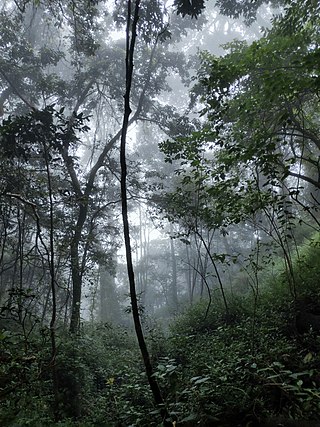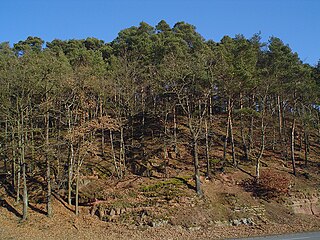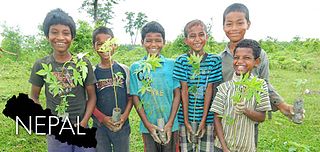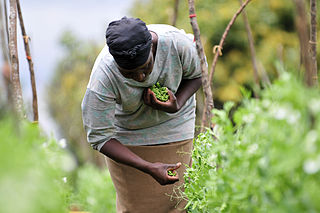
Sustainable development is an organizing principle that aims to meet human development goals while also enabling natural systems to provide necessary natural resources and ecosystem services to humans. The desired result is a society where living conditions and resources meet human needs without undermining the planetary integrity and stability of the natural system. Sustainable development tries to find a balance between economic development, environmental protection, and social well-being. The Brundtland Report in 1987 defined sustainable development as "development that meets the needs of the present generation without compromising the ability of future generations to meet their own needs". The concept of sustainable development nowadays has a focus on economic development, social development and environmental protection for future generations.

Forestry is the science and craft of creating, managing, planting, using, conserving and repairing forests and woodlands for associated resources for human and environmental benefits. Forestry is practiced in plantations and natural stands. The science of forestry has elements that belong to the biological, physical, social, political and managerial sciences. Forest management plays an essential role in the creation and modification of habitats and affects ecosystem services provisioning.

The Center for International Forestry Research (CIFOR) is a non-profit scientific research organization that conducts research on the use and management of forests with a focus on tropical forests in developing countries. CIFOR, which merged with World Agroforestry on Jan. 1, 2019, is the forestry and agroforestry research center of the Consultative Group on International Agricultural Research (CGIAR), a network of 15 research centers around the world that focus on agricultural research for sustainable development, working closely with governments and other partners to help develop evidence-based solutions to problems related to sustainable agriculture and natural resource management.

Forestry laws govern activities in designated forest lands, most commonly with respect to forest management and timber harvesting. Forestry laws generally adopt management policies for public forest resources, such as multiple use and sustained yield. Forest management is split between private and public management, with public forests being sovereign property of the State. Forestry laws are now considered an international affair.
The University of Arkansas at Monticello College of Forestry, Agriculture, and Natural Resources is located within the Henry H Chamberlin Forest Resource Complex on the UAM campus in Monticello, Arkansas. The Chamberlin Forest Resources Complex also houses the Arkansas Forest Resource Center. The School employs 17 faculty and offers three Bachelor of Science degrees, one Associate of Science degree, one Masters of Science degree, and five minors.

Sustainable forest management (SFM) is the management of forests according to the principles of sustainable development. Sustainable forest management has to keep the balance between three main pillars: ecological, economic and socio-cultural. Sustainable forestry can seem contradicting to some individuals as the act of logging trees is not sustainable. However, the goal of sustainable forestry is to allow for a balance to be found between ethical forestry and maintaining biodiversity through the means of maintaining natural patterns of disturbance and regeneration. The forestry industry mitigates climate change by boosting carbon storage in growing trees and soils and improving the sustainable supply of renewable raw materials via sustainable forest management. Successfully achieving sustainable forest management will provide integrated benefits to all, ranging from safeguarding local livelihoods to protecting biodiversity and ecosystems provided by forests, reducing rural poverty and mitigating some of the effects of climate change. Forest conservation is essential to stop climate change.

Landscape-scale conservation is a holistic approach to landscape management, aiming to reconcile the competing objectives of nature conservation and economic activities across a given landscape. Landscape-scale conservation may sometimes be attempted because of climate change. It can be seen as an alternative to site based conservation.

The United Nations Forum on Forests (UNFF) is a high-level intergovernmental policy forum. The forum includes all United Nations member states and permanent observers, the UNFF Secretariat, the Collaborative Partnership on Forests, Regional Organizations and Processes and Major Groups.
Antonio Gabriel Maestrado La Viña is a Filipino lawyer, educator, and environmental policy expert. A former undersecretary of the Department of Environment and Natural Resources (DENR), executive director of the Manila Observatory, and dean of the Ateneo School of Government, he currently teaches law, governance, and philosophy in the Ateneo de Manila University, University of the Philippines, De La Salle University, Xavier University, San Beda University, Polytechnic University of the Philippines, Lyceum of the Philippines University, Pamantasang ng Lungsod ng Maynila, Far Eastern University, Ateneo de Zamboanga, Liceo de Cagayan, and the Philippine Judicial Academy. In addition to these teaching responsibilities, La Viña is the director of the Energy Collaboratory of the Manila Observatory. He was also the chair of the Partnership Council, Partnership for the Environmental Management of the Seas of East Asia. Likewise, he was chair of the Board of Trustees of the Forest Foundation of the Philippines until September 2020.

Deforestation in Cambodia has increased in recent years. Cambodia is one of the world's most forest endowed countries, that was not historically widely deforested. However, massive deforestation for economic development threatens its forests and ecosystems. As of 2015, the country has one of the highest rates of deforestation in the world.

Deforestation in Indonesia involves the long-term loss of forests and foliage across much of the country; it has had massive environmental and social impacts. Indonesia is home to some of the most biologically diverse forests in the world and ranks third in number of species behind Brazil and the Democratic Republic of Congo.

Forest degradation is a process in which the biological wealth of a forest area is permanently diminished by some factor or by a combination of factors. "This does not involve a reduction of the forest area, but rather a quality decrease in its condition. "The forest is still there, but with fewer trees, or less species of trees, plants or animals, or some of them affected by plagues. This degradation makes the forest less valuable and may lead to deforestation. Forest degradation is a type of the more general issue of land degradation. Deforestation and forest degradation continue to take place at alarming rates, which contributes significantly to the ongoing loss of biodiversity.

The International Day of Forests was established on the 21st day of March, by resolution of the United Nations General Assembly on November 28, 2013. Each year, various events celebrate and raise awareness of the importance of all types of forests, and trees outside forests, for the benefit of current and future generations. Countries are encouraged to undertake efforts to organize local, national, and international activities involving forests and trees, such as tree planting campaigns, on International Day of Forests. The Secretariat of the United Nations Forum on Forests, in collaboration with the Food and Agriculture Organization, facilitates the implementation of such events in collaboration with governments, the Collaborative Partnership on Forests, and international, regional and subregional organizations. International Day of Forests was observed for the first time on March 21, 2013.

Climate change in Nepal is a major problem for Nepal as it is one of the most vulnerable countries to the effects of climate change. Globally, Nepal is ranked fourth, in terms of vulnerability to climate change. Floods spread across the foothills of the Himalayas and bring landslides, leaving tens of thousands of houses and vast areas of farmland and roads destroyed. In the 2020 edition of Germanwatch's Climate Risk Index, it was judged to be the ninth hardest-hit nation by climate calamities during the period 1999 to 2018. Nepal is a least developed country, with 28.6 percent of the population living in multidimensional poverty. Analysis of trends from 1971 to 2014 by the Department of Hydrology and Meteorology (DHM) shows that the average annual maximum temperature has been increasing by 0.056 °C per year. Precipitation extremes are found to be increasing. A national-level survey on the perception-based survey on climate change reported that locals accurately perceived the shifts in temperature but their perceptions of precipitation change did not converge with the instrumental records. Data reveals that more than 80 percent of property loss due to disasters is attributable to climate hazards, particularly water-related events such as floods, landslides and glacial lake outburst floods (GLOFs).

Climate change and gender are ways to interpret the disparate impacts of climate change on men and women, based on the social construction of gender roles and relations. Climate change and gender examines how men and women access and use resources that are impacted by climate change and how they experience the resulting impacts. It examines how gender roles and cultural norms influence the ability of men and women to respond to climate change, and how women’s and men’s roles can be better integrated into climate change adaptation and mitigation strategies. It also considers how climate change intersects with other gender-related challenges, such as poverty, access to resources, and unequal power dynamics. Ultimately, the goal of this research is to ensure that climate change policies and initiatives are equitable, and that both women and men benefit from them. Climate change increases gender inequality, reduces women's ability to be financially independent, and has an overall negative impact on the social and political rights of women, especially in economies that are heavily based on agriculture. In many cases, gender inequality means that women are more vulnerable to the negative effects of climate change. This is due to gender roles, particularly in the developing world, which means that women are often dependent on the natural environment for subsistence and income. By further limiting women's already constrained access to physical, social, political, and fiscal resources, climate change often burdens women more than men and can magnify existing gender inequality.

The Ministerial Conference on the Protection of Forests in Europe is a pan-European ministerial level voluntary political process for the promotion of sustainable management of European forests.

The Global Landscapes Forum (GLF) is a multi-stakeholder forum that facilitates participation in landscape approaches.

Due to its geographical and natural diversity, Indonesia is one of the countries most susceptible to the impacts of climate change. This is supported by the fact that Jakarta has been listed as the world's most vulnerable city, regarding climate change. It is also a major contributor as of the countries that has contributed most to greenhouse gas emissions due to its high rate of deforestation and reliance on coal power.
Nadine Therese Laporte has been a researcher and professor of forestry and remote sensing for over 30 years. She is adjunct research professor at Northern Arizona University. Prior to becoming a scientist at the Woods Hole Research Center, where she was director of the Africa program, she conducted postdoctoral research at the University of Maryland in College Park and NASA’s Goddard Space Flight Center in Greenbelt Maryland. Laporte's research contributed to tropical forest policies a part of REDD+ REDD+ is a policy mechanism to reduce carbon emissions by helping to protect tropical forests and lessen deforestation. She assisted the government of the Democratic Republic of the Congo to quantify forest carbon stocks and emissions reporting for REDD+ under the UN Framework Convention on Climate Change (UNFCCC). This method was suggested because it would help protect biodiversity, people living in the area, and maintaining stored carbon in these tropical ecosystems.

REDD originally referred to "reducing emissions from deforestation in developing countries", which was the title of the original document on REDD. It was superseded by REDD+ in the Warsaw Framework on REDD-plus negotiations.
















